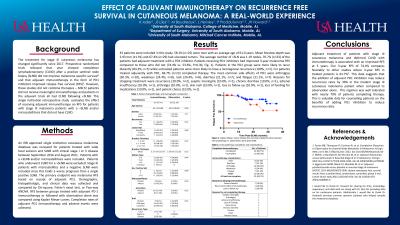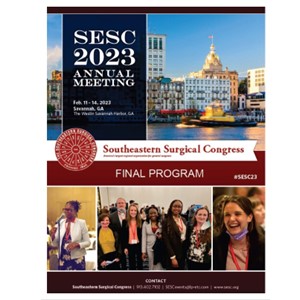Cancer
Category: Quickshot Oral Session 02
Quickshot Oral : Quickshot Oral Session 02
EFFECT OF ADJUVANT IMMUNOTHERAPY ON RECURRENCE FREE SURVIVAL IN MELANOMA PATIENTS: A REAL-WORLD EXPERIENCE.
Saturday, February 11, 2023
3:00pm - 4:00pm East Coast USA Time


Keith Adler, BA
Medical Student
University of South Alabama, United States
Keith Adler, BA
Medical Student
University of South Alabama, United States
Presenter(s)
Principal Contact(s)
Objectives: Prospective randomized trials have shown that completion lymphadenectomy (CLND) after a positive sentinel node biopsy (SLNB) does not improve melanoma specific survival and that adjuvant immunotherapy in the form of PD1 inhibitors improved relapse free survival (RFS) for stage III disease. While practice changing trials, the treatments were not evaluated together. We sought to evaluate the effect of adjuvant immunotherapy on stage III melanoma patients that did not have CLND.
Methods: Patients with Stage III disease treated with SLNB between September 2016 and July 2021 were reviewed. Patients undergoing CLND were excluded. Stage III patients with microsatellites and a negative SLNB were included. The primary endpoint was melanoma RFS based on receipt of adjuvant PD1. Demographic, histopathologic, and clinical data was collected and compared by Chi-square, Fisher’s exact test or Student t-test. Completion rates and adverse events for adjuvant immunotherapy were collected. RFS was compared using Kaplan Meyer curves.
Results: 39 patients were identified and included in this study. 56.4% (n=22) were men with an average age of 62.3 years. Mean Breslow depth was 2.86 mm and 62.5% (n=25) had ulcerated tumors. The average number of +SLN was 1.15 nodes. 74.3% (n=29) of the patients had adjuvant immunotherapy. Patient receiving immunotherapy had improved 3-year melanoma RFS compared to those who did not (75.4% vs. 53.6%, P=0.27). Patient in the PD1 group were more likely to recur distantly (100%, n=5) while patients in the untreated group were more likely to have a locoregional recurrence (100%, n=3). For patients treated with immunotherapy, 66.7% (n=18) were able to complete therapy with 2 patients still undergoing treatment. The most common side effects of PD1 were arthralgias (37.0%, n=10), weakness (28.6%, n=8), rash (25.9%, n=7), diarrhea (25.9%, n=7), and fatigue (22.2%, n=6). Treatment was stopped due to aseptic meningitis (14.3%, n=1), chronic diarrhea (14.3%, n=1), adrenal insufficiency (14.3%, n=1), arthralgia (14.3%, n=1), loss to follow up (14.3%, n=1), loss of funding for medications (14.3%, n=1), and patient choice (14.3%, n=1).
Conclusion: Treatment of patients with stage III cutaneous melanoma and deferred CLND with adjuvant immunotherapy is associated with a RFS benefit at 3 years and may reduce recurrence rates by 57%. Our 3-year RFS of 75.4% compares favorably to other studies where 3-year RFS in treated patients is 63.7%. This data is valuable for counselling patients on the benefits of adding PD1 inhibition to reduce recurrence rates.
Methods: Patients with Stage III disease treated with SLNB between September 2016 and July 2021 were reviewed. Patients undergoing CLND were excluded. Stage III patients with microsatellites and a negative SLNB were included. The primary endpoint was melanoma RFS based on receipt of adjuvant PD1. Demographic, histopathologic, and clinical data was collected and compared by Chi-square, Fisher’s exact test or Student t-test. Completion rates and adverse events for adjuvant immunotherapy were collected. RFS was compared using Kaplan Meyer curves.
Results: 39 patients were identified and included in this study. 56.4% (n=22) were men with an average age of 62.3 years. Mean Breslow depth was 2.86 mm and 62.5% (n=25) had ulcerated tumors. The average number of +SLN was 1.15 nodes. 74.3% (n=29) of the patients had adjuvant immunotherapy. Patient receiving immunotherapy had improved 3-year melanoma RFS compared to those who did not (75.4% vs. 53.6%, P=0.27). Patient in the PD1 group were more likely to recur distantly (100%, n=5) while patients in the untreated group were more likely to have a locoregional recurrence (100%, n=3). For patients treated with immunotherapy, 66.7% (n=18) were able to complete therapy with 2 patients still undergoing treatment. The most common side effects of PD1 were arthralgias (37.0%, n=10), weakness (28.6%, n=8), rash (25.9%, n=7), diarrhea (25.9%, n=7), and fatigue (22.2%, n=6). Treatment was stopped due to aseptic meningitis (14.3%, n=1), chronic diarrhea (14.3%, n=1), adrenal insufficiency (14.3%, n=1), arthralgia (14.3%, n=1), loss to follow up (14.3%, n=1), loss of funding for medications (14.3%, n=1), and patient choice (14.3%, n=1).
Conclusion: Treatment of patients with stage III cutaneous melanoma and deferred CLND with adjuvant immunotherapy is associated with a RFS benefit at 3 years and may reduce recurrence rates by 57%. Our 3-year RFS of 75.4% compares favorably to other studies where 3-year RFS in treated patients is 63.7%. This data is valuable for counselling patients on the benefits of adding PD1 inhibition to reduce recurrence rates.

